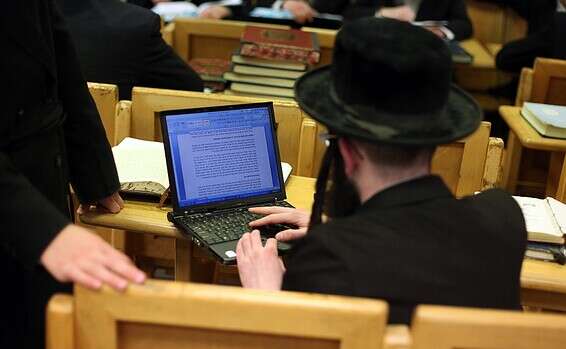
The ultra-Orthodox community has always lived as a kind of enclave, separate from the society in which it lived. Its rabbis have long opposed the use of the Internet, but with the outbreak of the coronavirus pandemic, many Haredim have rushed to get Internet to stay updated on the news.
"Internet use has accelerated during the [coronavirus] crisis and continues to do so," Dr. Gilad Malach told Israel Hayom. Malach is the director of the Israel Democracy Institute's Ultra-Orthodox in Israel Program.
"Many Haredim came to realize to what degree they were disconnected from the news and society in general, and began using the Internet even without official permission [from the rabbis]."
"They want a closer interaction with the world, especially because of the coronavirus. The rabbis' fight against the Internet is failing, at least at the moment."
Malach stressed that those who have already started using the Internet would not be too quick to give it up. The development has sociological consequences, too. For example, distance learning can be used for school and to integrate Haredim into the labor market.
"Access to the Internet may reshape the boundaries of the enclave, and that is why this change is so significant," he said.
The coronavirus has also aggravated the already strained relationship between the ultra-Orthodox and secular sectors in Israel. Each feels the exact opposite: Haredim think that the government does not take them into account in their coronavirus-related decisions and that the police use excessive force in their communities; secular Israelis feel that Haredi Knesset members have too much decision-making power, making sure no lockdown is instituted in religious neighborhoods and that there is not enough police enforcement when Haredi schools stay open during the lockdowns.
Meanwhile, the coronavirus is affecting the relationship between American and Israeli religious Jews, as well.
"There used to be a hint of arrogance in the American Hassidic community's treatment of their relatives in Israel. It was part of the common 'the wealthy American uncle will help his Israeli relatives' narrative," says Rabbi Elhanan Poupko, a member of the Rabbinical Council of America and serves as the president of EITAN-The American Israeli Jewish Network.
"That will never happen again. The balance of power has changed. The pandemic has severely affected the Chassidic community, including financially. It is a great lesson in humility. It is now the uncle from Bnei Brak or Jerusalem who is looking down on his cousin in New York. Israel is in a much better position now, we think," Poupko says.
Poupko believes a shift is required in the way the Israeli Haredim perceive their brethren in the US.
"The 'wealthy American uncle' mentality nurtured complacency. There is now a renewed responsibility on Israelis to hear from the other side [Jews in the US] and show genuine interest. This may be an opportunity to change the Israeli public's commitment to their brethren abroad," he says.
KINDLY SUPPORT OUR BLOG BY BROWSING THE ADS
THANKS SO MUCH,, IT MEANS THE WORLD TO US IN THESE DIFFICULT TIMESֱ
No comments:
Post a Comment